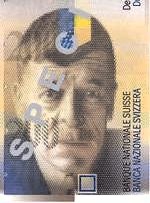
Charles Ferdinand Ramuz

This article needs additional citations for verification. (December 2017) |
You can help expand this article with text translated from the corresponding article in French. Click [show] for important translation instructions.
|
Charles Ferdinand Ramuz | |
|---|---|
 Ramuz on a 200-francs Swiss banknote. | |
| Born | 24 September 1878 Lausanne, Switzerland |
| Died | 23 May 1947 (aged 68) Lausanne, Switzerland |
| Occupation | Novelist, poet |
| Nationality | Swiss |
| Alma mater | University of Lausanne |
| Period | 1903–1947 |
| Notable works | La Grande Peur dans la Montagne |
| Spouse | Cécille Cellier (1872–1956) |
Charles Ferdinand Ramuz (24 September 1878 – 23 May 1947) was a French-speaking Swiss writer.

Biography

He was born in Lausanne in the canton of Vaud and was educated at the University of Lausanne. He taught briefly in nearby Aubonne, and then in Weimar, Germany. In 1903, he left for Paris and remained there until World War I, with frequent trips home to Switzerland. As part of his studies in Paris he wrote a thesis on the poet Maurice de Guérin.[1] In 1903, he published Le petit village, a collection of poems.[citation needed]

In 1914, he returned to Switzerland.[citation needed]

He wrote the libretto for Igor Stravinsky's Histoire du soldat.[citation needed]

He died in Pully, near Lausanne in 1947.[1] His likeness and an artistic impression of his works appear on the 200 Swiss franc note (no longer in current use).[citation needed]

The Foundation C.F. Ramuz in Pully awards the Grand Prix C. F. Ramuz.[citation needed]

Works
- Le petit village (1903)
- Aline (1905)
- Jean-Luc persécuté (1909)
- Aimé Pache, peintre vaudois (1911)
- Vie de Samuel Belet (1913)
- Raison d'être (1914)
- La Guerre dans le Haut Pays (1915)
- Le règne de l'esprit malin (1917) / The Reign of the Evil One, translated by James Whitall (Onesuch Press, 2014)
- La guérison des malades (1917)
- Les signes parmi nous (1919)
- Salutation paysanne (1919)
- Terre du ciel (1921)
- Présence de la mort (1922)
- La séparation des races (1922)
- Passage du poète (1923)
- L'amour du monde (1925)
- Chant de notre Rhône.(1920) / Riversong of the Rhone, translated by Patti M. Marxsen (Onesuch Press, 2015)
- La grande peur dans la montagne (1926) / Terror on the Mountain, translated by Milton Stansbury (Harcourt, Brace & World, 1967) / Great Fear on the Mountain, translated by Bill Johnston (Archipelago Books, 2024)
- La beauté sur la terre (1927) / Beauty on Earth, translated by Michelle Bailat-Jones (Onesuch Press, 2014)
- Adam et Eve (1932)
- Farinet, ou la fausse monnaie (1932)[2]
- Derborence (1934) / When the Mountain Fell, translated by Sarah Fisher Scott (Pantheon Books, 1947)
- Questions (1935)
- Le garçon savoyard (1936)
- Taille de l'homme (1937)
- Besoin de grandeur (1937)
- Si le soleil ne revenait pas... (1937) / As if the Sun were Never to Return, translated by Michelle Bailat-Jones (Onesuch Press, 2015)
- Paris, notes d'un vaudois (1938)
- Découverte du monde (1939)
- La guerre aux papiers (1942)
- René Auberjonois (1943)
- Nouvelles (1944)
Film adaptations
Ramuz's 1922 novel La séparation des races was adapted into the 1933 film Rapt by director Dimitri Kirsanoff. The film, shot on location in Switzerland, starred Geymond Vital. The Swiss writer S. Corinna Bille was a script editor on the film, after which she moved to Paris with Vital and married him.[3] The movie is best known for the musical score by Arthur Honegger.

In 1998,[4] Swiss director Francis Reusser adapted Ramuz's 1915 novel La Guerre dans le Haut Pays into a film titled War in the Highlands, starring French actress Marion Cotillard.[5]

Personal Life
Ramuz married Cecile Cellier, a Swiss Painter, in 1913 after she became pregnant with their only child, Marianne. He had one grandson, Guido Olivieri b.1940.

Legacy
His life and literary work are presented in a museum in his former home, La Muette, in Pully, Switzerland.


Awards

See also
Notes and references
- ^ a b "Charles Ferdinand Ramuz" (in German). Limmat Verlag. Archived from the original on 21 April 2016.
- ^ OCLC 702552369
- ^ Dubosson, Fabian (28 August 2023). "Ein Liebesdreieck am Filmset". Der Bund (in German).
- ^ Martin, Marie-Claude (7 October 1998). "Francis Reusser réalise un film de commande qui n'obéit à rien, sauf aux lois du romanesque". Le Temps (in French).
- ^ Cockrell, Eddie (14 March 1999). "War in the Highlands". Variety.
External links
- Charles Ferdinand Ramuz, in the Historical Dictionary of Switzerland.
- Publications by and about Charles Ferdinand Ramuz in the catalogue Helveticat of the Swiss National Library
- Biography of C.F. Ramuz
- French eds. of seven feature film adaptations of novels by Ramuz
See what we do next...
OR
By submitting your email or phone number, you're giving mschf permission to send you email and/or recurring marketing texts. Data rates may apply. Text stop to cancel, help for help.
Success: You're subscribed now !
